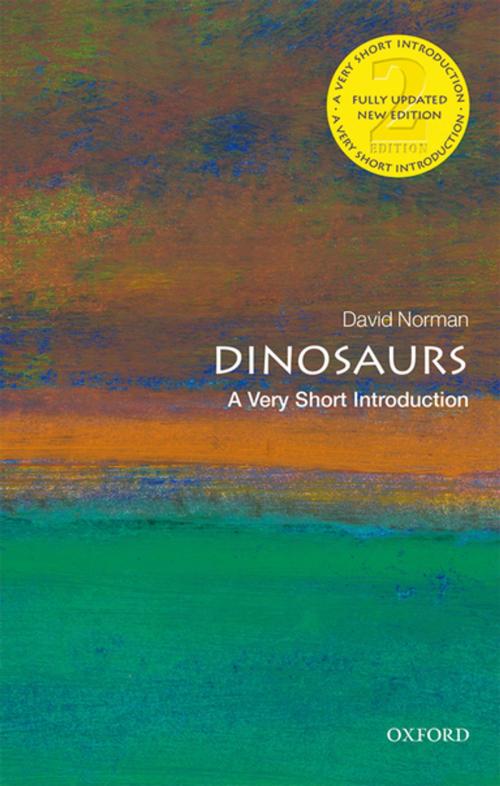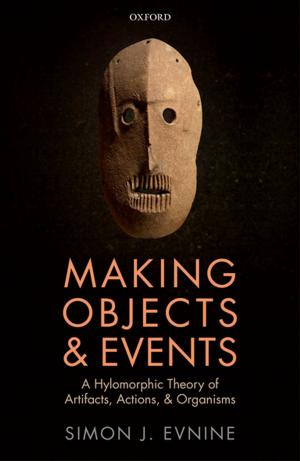Dinosaurs: A Very Short Introduction
Nonfiction, Science & Nature, Science, Earth Sciences, Palaeontology, Nature| Author: | David Norman | ISBN: | 9780192515643 |
| Publisher: | OUP Oxford | Publication: | September 21, 2017 |
| Imprint: | OUP Oxford | Language: | English |
| Author: | David Norman |
| ISBN: | 9780192515643 |
| Publisher: | OUP Oxford |
| Publication: | September 21, 2017 |
| Imprint: | OUP Oxford |
| Language: | English |
Dinosaurs are fascinating creatures and their popularity seems never ending, fuelled by films such as Jurassic Park and documentaries such as Walking with Dinosaurs. Yet dinosaurs (or more precisely non-avian dinosaurs) last trod the Earth 65 million years ago. All we know of them today are their fossilised bones, the tracks and traces that they left behind and, in very rare instances, some of the soft tissues or even traces of their chemistry. In many respects dinosaurs present us with one of the ultimate forensic challenges: they comprise the fragmentary remains of creatures that died many tens of millions of years ago, rather than just recently, or a few tens of years ago, which is the problem usually faced by forensic pathologists. How much do we really know about them, and to what extent can their remains inform us about ancient worlds, and indeed about the history of our planet? In this Very Short Introduction David Norman discusses how dinosaurs were first discovered and interpreted, and how our understanding of them has changed over the past 200 years. He looks at some of the amazing discoveries that have enabled us to gain new and unexpected insights into dinosaurs as animals with natural histories and behaviours, and considers some of the biggest questions in dinosaur biology, such as the implications of them having warm blood. Norman also shows how research upon dinosaurs has been enriched, particularly in recent decades, by technological break-throughs, which complement the informed speculation and luck which have played a part in many of the major discoveries. ABOUT THE SERIES: The Very Short Introductions series from Oxford University Press contains hundreds of titles in almost every subject area. These pocket-sized books are the perfect way to get ahead in a new subject quickly. Our expert authors combine facts, analysis, perspective, new ideas, and enthusiasm to make interesting and challenging topics highly readable.
Dinosaurs are fascinating creatures and their popularity seems never ending, fuelled by films such as Jurassic Park and documentaries such as Walking with Dinosaurs. Yet dinosaurs (or more precisely non-avian dinosaurs) last trod the Earth 65 million years ago. All we know of them today are their fossilised bones, the tracks and traces that they left behind and, in very rare instances, some of the soft tissues or even traces of their chemistry. In many respects dinosaurs present us with one of the ultimate forensic challenges: they comprise the fragmentary remains of creatures that died many tens of millions of years ago, rather than just recently, or a few tens of years ago, which is the problem usually faced by forensic pathologists. How much do we really know about them, and to what extent can their remains inform us about ancient worlds, and indeed about the history of our planet? In this Very Short Introduction David Norman discusses how dinosaurs were first discovered and interpreted, and how our understanding of them has changed over the past 200 years. He looks at some of the amazing discoveries that have enabled us to gain new and unexpected insights into dinosaurs as animals with natural histories and behaviours, and considers some of the biggest questions in dinosaur biology, such as the implications of them having warm blood. Norman also shows how research upon dinosaurs has been enriched, particularly in recent decades, by technological break-throughs, which complement the informed speculation and luck which have played a part in many of the major discoveries. ABOUT THE SERIES: The Very Short Introductions series from Oxford University Press contains hundreds of titles in almost every subject area. These pocket-sized books are the perfect way to get ahead in a new subject quickly. Our expert authors combine facts, analysis, perspective, new ideas, and enthusiasm to make interesting and challenging topics highly readable.















